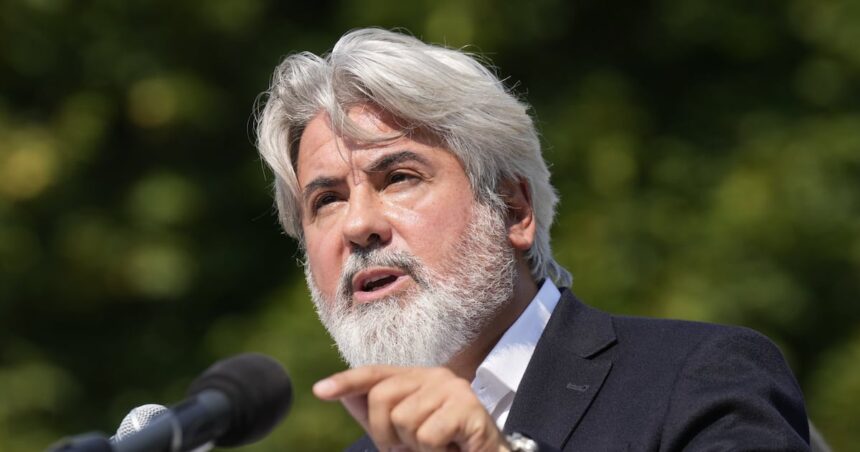Montreal’s political landscape shifted significantly today as two prominent MNAs threw their support behind Pablo Rodriguez in the Quebec Liberal leadership race, potentially altering the contest’s trajectory and bringing new energy to a party seeking renewal.
Marwah Rizqy and Gregory Kelley, both respected voices within the Quebec Liberal Party, announced their endorsement of Rodriguez during a press conference at Montreal’s Palais des congrès. The scene buzzed with anticipation as supporters gathered to witness what many political observers are calling a pivotal moment in the leadership campaign.
“Pablo represents the fresh perspective our party needs while honoring our core values,” said Rizqy, the energetic MNA for Saint-Laurent, whose passionate delivery resonated with attendees. “His vision for Quebec combines pragmatic solutions with progressive ideals that will speak to voters across our province.”
Kelley, representing the Jacques-Cartier riding, emphasized Rodriguez’s ability to bridge divides within Quebec society. “What impresses me most about Pablo is his genuine commitment to both linguistic communities while advocating for a united Quebec future,” he remarked, switching effortlessly between French and English during his address.
The endorsements come at a critical juncture for the Quebec Liberals, who have struggled to redefine their identity since their 2018 electoral defeat. The party currently holds just 19 seats in the National Assembly, down from the 31 they secured in the previous election.
Rodriguez, who currently serves as a federal Liberal MP and Lieutenant for Quebec, has positioned himself as a candidate who can revitalize the provincial party. His campaign emphasizes economic growth, environmental sustainability, and protecting linguistic rights – themes that resonate deeply across Montreal’s diverse communities.
During my conversation with attendees after the announcement, the mood was noticeably optimistic. “It feels like we’re turning a page,” shared Marie Clermont, a long-time Liberal supporter from Verdun. “Rodriguez understands Montreal’s unique character but also speaks to regions throughout Quebec.”
Political analyst Jean-Marc Léger from the University of Montreal believes these endorsements carry significant weight. “Rizqy and Kelley represent different wings of the party, so their unified support suggests Rodriguez may be building a coalition that could ultimately unite the Liberals,” he told me when reached for comment.
The leadership race comes at a challenging time for the Quebec Liberals. Recent Léger polls show them struggling to connect with francophone voters outside Montreal, with support hovering around 17 percent provincially. Meanwhile, the governing Coalition Avenir Québec maintains a comfortable lead despite recent controversies.
Rodriguez’s campaign team appears energized by today’s developments. Campaign manager Sophie Tremblay noted that their volunteer numbers have doubled in the past week. “People are responding to Pablo’s message of inclusive prosperity,” she said. “Today’s endorsements will only accelerate that momentum.”
Other leadership contenders, including Frédéric Beauchemin and Denis Coderre, have yet to respond publicly to today’s announcements. The deadline for candidates to enter the race is approaching, with a final decision expected by early summer 2023.
The Quebec Liberal Party has historically served as the primary federalist option in provincial politics, often representing English-speaking communities and immigrants while maintaining support among moderate francophones. Their current identity crisis follows two consecutive electoral defeats.
What makes this leadership race particularly significant is the broader political context. Premier François Legault’s government has implemented controversial measures like Bill 96, strengthening French language requirements, and Bill 21, restricting religious symbols for certain public employees – policies that have divided Quebecers.
“Rodriguez has the opportunity to present a compelling alternative vision,” explains political scientist Emmanuelle Richez from Université de Sherbrooke. “His challenge will be articulating that vision in a way that respects Quebec’s distinct character while championing individual rights.”
As I left the Palais des congrès, watching supporters energetically discussing the day’s events over coffee at nearby cafés, it was clear that Rodriguez’s campaign had gained significant momentum. Whether this translates into broader appeal remains the question that will define not just this leadership race, but potentially Quebec’s political future.
The coming weeks will reveal if other prominent Liberals join Rizqy and Kelley in supporting Rodriguez, or if competing candidates can mount effective counternarratives. What’s certain is that Montreal’s political circles will be watching these developments with intense interest as the race enters its critical phase.







